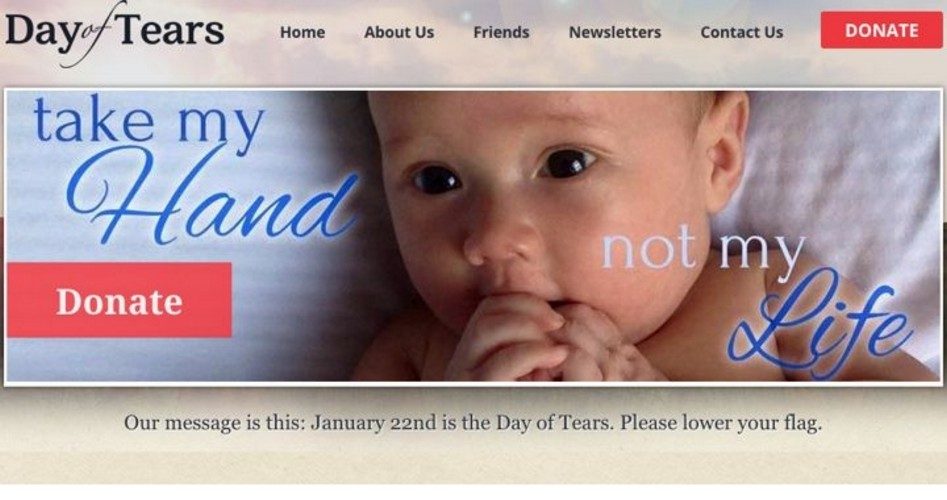
In an unprecedented move, the state of Virginia has taken a bold stand acknowledging the sanctity of life. With a vote of 57-36, the Virginia House of Delegates adopted a resolution last Wednesday to remember the millions of lives lost to abortion.
January 22 has long been known as the anniversary of Roe v. Wade, the 1973 Supreme Court case that legalized abortion across the nation. Since that day, an estimated 59 million unborn babies have lost their lives to this legalized murder, and the number continues to grow.
Now, however, in the state of Virginia, January 22 will henceforth be known as a “Day of Tears” — a day to mourn the loss of these lives.
House Resolution 268, introduced by Delegate Ben Cline (R-Rockbridge), encouraged the citizens of the Commonwealth to fly their flags at half-staff on this day in memory of the lost lives:
Whereas, on January 22, 1973, the majority of the members of the Supreme Court ruled that abortion was a right secured by the Constitution; and whereas, since that fateful day, over 58 million unborn children have perished now, therefore, be it resolved by the House of Delegates, that January 22 hereby be recognized as the Day of Tears in Virginia and that the citizens of the Commonwealth of Virginia be encouraged to lower their flags to half-staff to mourn the innocents who have lost their lives to abortion.
In a press conference, Cline stated,“By making a visual step in support of life, hopefully we can help save lives.”
Day of Tears, Inc. is a Virginia-based, non-profit organization that not only carries the name of the new resolution, but also is the impetus behind it. The organization reached out to delegates Cline and Richard Bell proposing the resolution, with the understanding that if adopted by the House, it would not need the approval of the Senate,and could not be vetoed.
In an interview with The New American, Ken Adams, leader of Day of Tears, said that though the organization intends to take this campaign across the country, they realize that there are states that will not support it. The real goal of Day of Tears, he added, is to change the culture. A statement on the Day of Tears Facebook page reads:
Ordinary Americans, such as you, cannot change the Supreme Court. You cannot pass a Constitutional Amendment. You cannot force Congress to act. And, you cannot stop Planned Parenthood. But you can lower your flag…. We believe that if the culture can be changed, that will contribute to the ending of abortion.
Since laws are an external expression of the values of a culture, the organization’s statement makes a good point. A culture of death will embrace — or at least permit — atrocities such as abortion. A culture that values life will work to put an end to those atrocities.
Adams stated,
The intent is that when people all over the country, even in states like New York and California, wake up on January 22 and go about their business, whether it’s going to school, going to work, going to the food store, they’ll see flags lowered at half-staff, and they will say, “who died?”
Unfortunately, there are those who have a narrower view of Virginia’s new resolution, claiming its purpose is to “shame women.”
The Virginia chapter of NARAL (the National Abortion Rights Action League) complained:
This resolution was yet another example of Virginia politicians trying to shame women for their personal reproductive decisions and stigmatize abortion. In addition to imposing multiple restrictions that make accessing abortion as difficult as possible for Virginia women, these politicians now also want to tell women who’ve had an abortion how to feel and show them their government disrespects their decisions.
Some would go so far as to denounce compassion for the victims, while calling for pity for the perpetrators. “If tears must be shed, it should be shed for those women who have irreparably harmed themselves — who faced hemorrhaging and infection because they lacked access to health care,” claimed Virginia House Democratic Caucus Chair Charniele Herring.
As this resolution passes no judgment on anyone, but clearly seeks to encourage citizens to live out a personal conviction and right, one could hardly see how these criticisms could be taken seriously. However, they are. Not only have these criticisms found a sense of validity, but they have engendered sympathy in a culture where feelings have more worth than values.
As the Old Dominion State leads the way, Day of Tears, Inc. has reached out to legislators in other states, including West Virginia, Indiana, and Illinois, to ask their legislators to consider passing a similar resolution. Hopefully, many will follow Virginia’s example and help recognize the humanity of the unborn. And at the sight of every lowered flag on January 22 of every year to come, may someone be prompted to ask, “Who died?”


